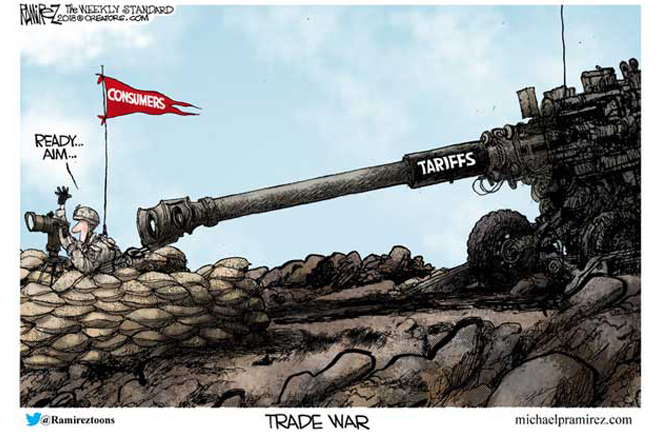Scholar: Bilateral deficits don’t mean much, overall deficits do

Eventually a trade war hurts consumers. (ammoland.com)
US President Donald Trump’s trade policy toward China is misguided because bilateral trade deficits do not matter as much as the overall trade deficit, said Harvard economist Dwight Perkins.
Perkins, a professor of political economy, criticized Trump’s protectionism during a recent interview with CSST.
On March 22, Trump signed a memorandum that would impose high tariffs on up to $60 billion worth of Chinese products, including steel and aluminum imports. The decision to slap high tariffs on Chinese imports is aimed at reducing the bilateral trade deficit.
Perkins argued that the policy makes no sense because the United States has an overall deficit.
“If you reduce the surplus in China, it will just show up in other countries, in Bangladesh or India, or South Korea, because the American deficit will stay the same.”
The reason why the United States has a large deficit overall, Perkins suggested, is that its saving rate is low while its exchange rate is favorable, so people just buy a lot more imports than exports.
Scholars from China and the US have argued that imposing tariffs on Chinese imports will only hurt American consumers.
“Obviously once you start putting tariffs on all of these things, the price to American users of the goods would go up. Eventually it hurts all the users of the goods. That was actually the big problem of steel. If they actually kept tariffs on steel to all the countries that actually do exports to us, it would raise the cost of steel to hundreds of sectors in the US economy just in order to preserve a few jobs in the steel industry,” Perkins said.
In response to the US tariff proposals, China unveiled a list of products worth $50 billion imported from the United States that will have an additional tariff of 25 percent imposed on them, including soybeans, automobiles and chemical products.
Given the trade tensions between the United States and China, some observers are worried that a possible trade war is around the corner.
“There is nothing complicated about a trade war. You slap restrictions on the imports of the country, and they retaliate by slapping other restrictions. What is going to happen in this case is, Trump is going to slap this on, and China is going to respond,” Perkins said.
But a real trade war between China and the United States might not be inevitable, because “most likely, China will aim at things that are politically sensitive, like soybeans, because a lot of areas that vote Republican produce soybeans.”
In addition, China has repeatedly emphasized opposition to trade protectionism and support for open trade. President Xi Jinping expressed China’s commitment to opening up its markets in his keynote address at the Boao Forum for Asia 2018 annual conference.
Most scholars believe a trade war will only lead to a “lose-lose” scenario. The extreme version of a trade war is the Smoot-Hawley Tariff, which Perkins identified as “the real trade war.” That trade war even contributed to a real war.
“Smoot-Hawley Tariff was the American version, a very high tariff barrier to protect American industry. Then all the other countries did the same thing and so foreign trade fell off. So everybody lost. In fact one of the reasons that we ended up into the World War II was because of the trade war,” Perkins said.
An alternative to a trade war is to resolve trade disputes within the framework of the WTO. “If you are supposed to complain to the WTO, then the WTO analyzes it and if that agrees that you are being unfairly hurt by those tariffs, then you have the right to retaliate. That is not the trade war. That is the WTO doing its work. What Trump is doing is ignoring all that and simply putting tariffs on a whole range of Chinese goods,” Perkins argued.
Perkins also dismissed the accusation that the loss of jobs in American manufacturing can be attributed to China. “There is no question that politically a lot of people think that the major reason for the loss of jobs in manufacturing in particular is because the jobs went to China. And it is true that some jobs went to China. But the major reason why employment in manufacturing is going down is mechanization, like robots. Even if the part of that didn’t go to China, it would go on somewhere else.”
Talking about the current trend of anti-globalization in some countries, Perkins suggested that the hard core of anti-globalization is just wrong and “most economists will tell you that.” “Trump’s advisor is an exception,” he added.
“Trump’s trade advisor Peter Navarro holds a doctorate from this department, but he doesn’t appear to understand economics,” Perkins said.
In fact, there was an advisor who was not an exception and he strongly opposed the decision to impose tariffs. Gary Cohn, President Trump’s former chief economic adviser, resigned after Trump signed the memorandum to impose tariffs.
FENG DAIMEI, WANG JIANFENG are correspondents with Chinese Social Sciences Today.
(edited by JIANG HONG)

 PRINT
PRINT CLOSE
CLOSE